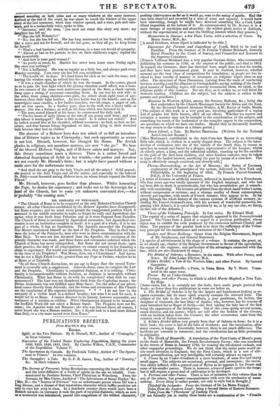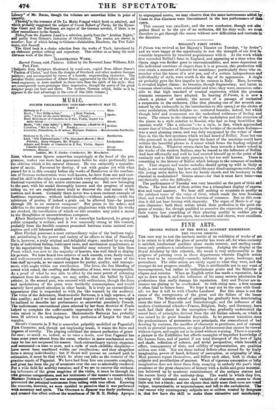PUBLICATIONS RECEIVED.
From May 9th to May 15th.
BOOKS.
Sybil; or the Two Nations. By B. Disraeli, M.P., Author of " Coningsby." In three volumes.
Narrative of the United States Exploring Expeditioss, daring the years 1838, 1839, 1840, 1841, 1842. By Charles Wilkes, U.S.N., Commander of the Expedition. Volume V.
The Sportsman in Canada. By Frederick Tolfrey, Author of "The Sports- man in France." In two volumes.
The Smuggler; a Tale. By G. P. R. James, Esq., Author of " Darnley,"
&c. In three volumes.
The Seeress of Prevorst; being Revelations concerning the inner-life of man
and the inter-diffusion of a world of spirits in the one we inhabit. Com- municated by Justinus Kerner, Chief Physician at Weinsberg. From the
German, by Mrs. Crowe, Author of " The Adventures of Susan Hopley," &c. [Mrs. H— the " Seeress of Prevorst" was an unfortunate person whose life was a long disease, and a disease of that mysterious character which baffles medicine not only to cure but even to class. In a Southern country there would have been a Flemish miracle: in Germany it took the garb of mystical diablerie; which, as soon as a mesmerist was introduced, passed into magnetism of the wildest character,
pushing clairvoyance as far as it would go, even to the seeing of spirits. Had tho case been observed and recorded by a man of sense and sagacity, it would has been interesting, though he might have detected something like a Cock Lane Ghost imposition at the bottom of it. As communicated by Dr. Kerner, it is mere farrago of mysticism and absurdity: the wildest ghost stories or diablerie, without the supernatural, or at least the thrilling interest which they possess.)
Mesmerism in Disease; • a few Plain Facts, with a selection of Cases. By
Henry Storer, M.D., &c.
[A small brochure, whose object is indicated by its title.] Discourses for Parents and Guardians of Youth, fitted to be read in Families. From the German of D. Francis Volkmar Reinhard, formerly Royal Preacher to the Court of Saxony, and Counsellor and Assessor to the Supreme Consistory. [Francis Volkmar Reinhard was a very popular German divine, who commenced publishing his sermons in 1795, at the request of the public, and died in 1812. As regards the Germans, there has therefore been ample time to test his merits, and they have been pronounced great. It may be doubted, however, whether sermons are the best class of compositions for translation; as people are less in- clined to bear novelty of manner or treatment on religions topics than on any other. The structure of these Discourses, (arising from the mode of conducting German worship,) and the allusions to German habits, saying nothing of the theolo- gical manner of handling topics, will scarcely recommend them, we think, to the religious public of this country. Nor are they, as it strikes us, so well fitted for domestic reading. Children are the subject, but the address is rather, to the parents and guardians.] Missions in Western Africa, among the Soosoos, Bulloms, Scc.; being the first undertaken by the Church Missionary Society for Africa and the East. By the Reverend Samuel Abraham Walker, A.M., Rector of Gallo, Meath. [The subject of this work is a very good one, involving particulars of a region
and of peoples but little known, after all our efforts. hether too narrow and sectarian a manner may not be brought to the consideration of the subject, and something too much of the bookmaker or the compiler appear in the composition, are questions on which we have our doubts. Should they be favourably resolved, we may return to the volume at a future period.]
Dawn Island; a Tale. By Harriet Martineau. (Written for the National Anti-Corn-law Bazaar.) [bliss Martineau's contribution to the Anti-Corn-law Bazaar is an interesting little tale, which is clothed in a neatly elegant dress. The subject is the intro- duction of civilization into one of the, Islands of the South Seas, by means of speeches on morals and barter by a skipper, representative of the League; whilst an elderly priest, a king, and the influential nobility, standing up for the sacrifice to the gods of the first-tom children, and other heathen customs, may be takes as types of the landed interest, sacrificing the poor by means of a corn-law. The story is effectively enough contrived, and cleverly told.] Phreno-Mnemotechny, or the Art of Memory; the Series of Lectures, explanatory of the principles of the system, delivered in New York and Philadelphia, in the beginning of 1844. By Francis Fauvel-Gourauds D.E.S., of the University of France.
[A series of lectures on artificial memory, delivered in America by a Frenchman, who four years ago was totally ignorant of the English language, and who has not been able to study it systematically, but who has nevertheless got it remark- ably well considering. The lectures are printed from the short-hancl-writer's notes, without compression or revision; and a strange medley of fluent commonplace, cleverly put together, with much of French manner, they appear to be. As for going through the whole history of the various systems of artificial memory, in- cluding Mr. Fauvel-Gouraud's own, with his account of wonderful memories, be- ginning with Adam's, it is out of the question by us, or by any one else, we fancy, on this side of the Atlantic.]
Views of the Voluntary Principle. In four series. By Edward Miall. [The reprint of a series of papers that originally appeared in the Nonconformist journal. The Views form a kind of a sequel to a previous publication, whose object was to exhibit the evils produced by the connexion between Church and State. The purpose of the present book is to show the sufficiency of the Volun- tary principle for the maintenance and extension of the Church.] Sambre and Meuse Railway: Grant from the Belgian Government, Report of Mr. Stephenson, and General Statement. [A species of advertisement in the shape of a volume. It contains the grant, or, as we should say, charter of the Belgian Government in favour of the speculation, the report of the engineer, and particulars of the advantages connected with the line; which are also illustrated by maps.] The Bridal of Salerno; a Romance in six cantos. With other Poems, and Notes. By John Lodge Ellerton, Kilda's Bridal; a Tale of the Western Isles; and other Poems. By Samuel Gasquoine. The Death of Basseville; a Poem, in Tema Rlma. By V. Monti. Trans- lated in the same verse.
Poems. By an Under-Graduate. Fortune, and other Poems; to which is added Maria Maybud, a True Tale. By Hope.
[Some cause, but it is certainly not the Gods, have made people poetical this week: no fewer than five publications in verse are before us.
1. The Bridal of Salerno is by far the largest and handsomest-looking as re- spects externals; but its inner spirit scarcely sustains the outward form. The subject of the tale is the love of Goffredo, a poor gentleman, for Isolina, the daughter of Guiscard, the last Duke of Ap;dia; who, however, has for reasons of state betrothed her to Roger of Sicily,—the first inkling the lady has of the fact being the appearance of the bridegroom. Out of this cross spring several scenes,. much distress, and six cantos; which are told after the fashion of the Giaour, with an incident taken from the Corsair; the other occurrences come from the common stock of Italian romance.
2. Kilda's Bridal differs very greatly from that of Salerno in form: for it is little book; the scene is laid in the Isles of Scotland; and the termination, after many crosses, is happy. Essentially, however, there is not much difference. The incidents are common to romances; and the versification has as little pretension to originality. 3. The Death of Basseville. A translation of the First Canto of Monti's poem on the death of Basseville, the French Revolutionary Envoy; who was murdered in the streets of Rome in January 1793, for wearing the tricoloured cockade, and other unpopular proceedings. We do not think that the entire poem would ex- cite much attention in England;but the First Canto, which is a sort of alle- gorical personification, not very intelligible, will certainly attract no regard. 4. Poems by an Under-Graduate is a mere brochure, of some five-and-thirty small pages. The subjects are occasional, personal, and incomplete; the execu- tion rather inflated, with a general cast of Byron as he appears in his Dream and some of his smaller poems. There is, however, a trace of poetic spirit in the verse; but it will require a great deal of cultivation to be developed. 5. Fortune and other Poems. There is less of imitation in this volume than in
any of the others, but greater unaequaintance with even the mechanics of verse-
making. Every thing is rather prosaic, not only in style but in thought.] Thiodolf the Icelander. From the German of be La Motte Fouque. Tales from the Eastern Land ; being a Second Series of Eastern Romance. Tales frost the " Phantasm" of Ludwig Tieck.
[If not formally yet in reality these books are a continuation of the " Fireside Library' of Mr. Burns, though the volumes are somewhat faller in point of quantity.
27aodolf is the romance of De La Motte Fonque which Scott so admired, and which probably suggested the subject of Count Robert of Paris- for the Byzan- tine Court and the Northroen are topics of the German novelist, if there is no other resemblance to the Scotch.
Tales from the Eastern Land is a selection, partly from the " Arabian Nights," and' partly from Grimm's imitation of Orientilism. The stories are eleven in number; four of which belong to Grimm—Jabiladden, Baschcm, the Two Talis- mans, and Jussuff
The third book is a choice selection from the works of neck, introduced by an elaborate preface critical and expository. This strikes us as being the most German work of the three.]
ILLUSTRATED WORK.
Sacred Verses, with Pictures. Edited by the Reverend Isaac Williams, B.D. Part First.
[Subjects from Scripture illustrated by wood-cats, copied from Albert Darer's Passion of Christ," and from the designs of Overbeck and other modern German painters; and accompanied by verses of a homely, unpretending character. The peculiar Gothic mannerism of Albert Durer, aggravated by the defects of the old wood-engravers, is more marked in these cuts than the spirit of his style: they are consequently more grotesque than impressive, though the power of the great designer peeps out here and there. The modern German school, feeble as it is, appears to the best advantage in the cuts of this little volume.]



























 Previous page
Previous page